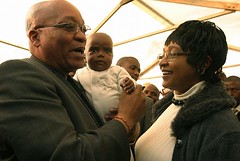
South African ruling party ANC president Jacob Zuma (L) holds an infant as Winnie Mandela (R) and ex-wife of former South African President Nelson Mandela, looks on during a visit on May 30, 2008.
Originally uploaded by Pan-African News Wire File Photos
CAPE TOWN--South Africa’s president-elect Jacob Zuma yesterday vowed to work quickly to boost the nation’s limping public services while bolstering the economy, as parliament named him the new head of state.
Zuma led the African National Congress (ANC) to a sweeping election victory two weeks ago on an anti-poverty platform, vowing to extend the social safety net while improving education, health care and policing.
"It is my fervent hope that our public servants heard our campaign message and understand that it shall not be business as usual," he told parliament, shortly after lawmakers named him the new president.
"We expect hard work and utmost dedication," he said.
Zuma said he planned for his cabinet to take office by Monday, following his own inauguration on Saturday.
"I should be able to produce a team that will work very hard and with the necessary speed. We mean business when we talk about faster change," he said in the nationally broadcast speech.
ANC supporters sang in the aisles as the secret ballots were counted, and chanted "Zuma, Zuma" as the 277-47 vote was announced.
"He is a capable leader that epitomises our continued and resilient struggle against the worst that humanity has to offer and the hope that we as a nation shall triumph against all odds," said Winnie Madikizela-Mandela, the ex-wife of democracy icon Nelson Mandela, as she nominated Zuma.
Thirteen members of smaller parties joined the ANC in voting for Zuma. The only rival candidate was Mvume Dandala from the ANC breakaway party the Congress of the People.
The main opposition Democratic Alliance, which holds 67 seats, abstained from the vote.
It was a triumphant return to parliament for Zuma, who was booted out of the national assembly in 2005 when he was fired by then president Thabo Mbeki after his former financial advisor Schabir Shaik was jailed for fraud and corruption.
Zuma was implicated in the charges against Shaik, facing his own eight-year long battle with graft charges which were finally dropped last month amid evidence of government interference in pursuing the case.
His victory was hard-won and came on a wave of popular support as his hardline backers cried foul and claimed a conspiracy against him, splitting the ANC into two camps and resulting in a near political crisis.
While the ANC won elections with a convincing majority, the party did not go unscarred by the internal bickering and a record of failed public service delivery, narrowly losing a two-thirds majority which had enabled it to pass constitutional changes.
His pledges to expand the social safety net will become more difficult to achieve as South Africa’s economy appears to be sliding into a recession, with a new survey showing 208 000 people lost their jobs in the first three months of the year.
That put the official unemployment rate at 23,5 percent, but the figure is believed to be closer to 40 percent if discouraged workers no longer seeking jobs are included.
The dim economic outlook has heightened speculation about who will fill key cabinet posts, especially finance, health and education.
Zuma’s leftist backers from trade unions and the Communist party had complained of being sidelined under Mbeki, and are pushing for a greater voice in Zuma’s cabinet.
The hottest topic is who will head the finance ministry, which has been widely hailed under Trevor Manuel for 13 years.
Manuel is credited with policies that have protected the country from the banking crisis, but he has often clashed with unions over his market-friendly policies.
Local media tip him to lead a powerful new oversight body that is to monitor government’s performance, while respected tax boss Pravin Gordhan could take his place at finance. — AFP.
No comments:
Post a Comment